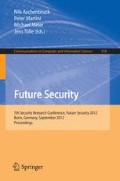Abstract
This paper presents a methodology to analyse unstructured end user feedback gathered from usability evaluations. Usability can mean the difference between success or failure of a product. There exist a significant number of methodologies for measuring usability. However just a very few general, structured approaches for analysing unstructured usability evaluation data gathered in interviews is published. This paper regards on the deficit and presents the methodology SumSARSEP. After the preparation phase with the clustering of the user requirements, generation of hypotheses, definition of user-oriented scenarios and designing of the interviews the analysis phase follows. The seven steps provide a result about the fulfillment of the user requirements and additionally a prioritisation list to implement the findings drawn from the end user feedback.
Access this chapter
Tax calculation will be finalised at checkout
Purchases are for personal use only
Preview
Unable to display preview. Download preview PDF.
References
Xiaoping, Z., Tingkuan, Z., Mengting, L.: Modeling crowd evacuation of a building based on seven methodological approaches. Building and Environment 44, 437–445 (2009)
Bias, R., Mayhew, D.: Cost-Justifying Usability: An Update for the Internet Age. Morgan Kaufmann, San Francisco (2005)
Bogner, A., Littig, B., Menz, W.: Interviewing experts. Palgrave Macmillan (2009)
Courage, C., Baxter, K.: Understanding Your Users: A Practical Guide to User Requirements Methods, Tools, and Techniques. Morgan Kaufmann Publishers Inc., San Francisco (2004)
Dumas, J., Redish, J.: A Practical Guide to Usability Testing, Intellect Ltd. (1999)
Akkreditierungsstelle DATech: DATech-Prüfhandbuch Gebrauchstauglichkeit (DATech Test Handbook Usability), Akkreditierungsstelle DATech, Frankfurt a.M (2006)
Feuerwehr-Dienstvorschrift 100 - Führung und Leitung im Einsatz (fire department manual 100 – leadership and conductorship in operation). Deutscher Gemeindeverlag, Stuttgart (2003)
Feuerwehr-Dienstvorschrift 500- Einheiten im ABC-Einsatz (fire department manual 500 – units in CBRN-operation). Deutscher Gemeindeverlag, Stuttgart (2004)
Følstad, A., Law, E., Hornbæk, K.: Analysis in usability evaluations: an exploratory study. In: Proceedings of the 6th Nordic Conference on Human-Computer Interaction: Extending Boundaries (NordiCHI 2010), pp. 647–650. ACM, New York (2010)
Lewis, C.: Using the ‘thinking-aloud’ method in cognitive interface design. Research Report RC9265. IBM T.J. Watson Research Center, Yorktown Heights, NY (1982)
Manhartsberger, M., Musil, S.: Web Usability - Das Prinzip des Vertrauens (Web Usability - the principle of trust). Galileo Press (2002)
Mahatody, T., Sagar, M., Kolski, C.: State of the art on the cognitive walkthrough method, its variants and evolution. International Journal of Human-Computer Interaction (2010)
Nielsen, J.: Usability Engineering. Morgan Kaufmann (1993)
Norgaard, M., Hornbaek, K.: What Do Usability Evaluators Do in Practice? An Explorative Study of Think-Aloud Testing. In: Proc. DIS 2006. ACM Press (2006)
Richter, M.: Effiziente Implementierung von UCD-Methoden in Unternehmen (2010)
Rubin, J., Chrisnell, D.: Handbook of Usability Testing. Wiley Publishing (2008)
Rupp, C.: Requirements-Engineering und -Management. Professionelle, iterative Anforderungsanalyse für die Praxis (Requirements-Engineering and Management. Professional, iterative analysis for practice). vol. 4. Aufl., Hanser Fachbuchverlag, München (2007)
Shneiderman, B., Plaisant, C.: Designing the user interface. Pearson (2010)
Turoff, M., Chumer, M., van der Walle, B., Yao, X.: The Design of a Dynamic Emergency Response Management Information System (DERMIS). The Journal of Information Technology Theo7ry and Application (JITTA) 5(4), S.1–S.35 (2004)
Tullis, T., Albert, B.: Measuring the User Experience. Morgan Kaufman (2008)
Author information
Authors and Affiliations
Editor information
Editors and Affiliations
Rights and permissions
Copyright information
© 2012 Springer-Verlag Berlin Heidelberg
About this paper
Cite this paper
Friberg, T., Schäfer, C., Koch, R. (2012). Methodology for Analysing Unstructured Usability Evaluation Data. In: Aschenbruck, N., Martini, P., Meier, M., Tölle, J. (eds) Future Security. Future Security 2012. Communications in Computer and Information Science, vol 318. Springer, Berlin, Heidelberg. https://doi.org/10.1007/978-3-642-33161-9_37
Download citation
DOI: https://doi.org/10.1007/978-3-642-33161-9_37
Publisher Name: Springer, Berlin, Heidelberg
Print ISBN: 978-3-642-33160-2
Online ISBN: 978-3-642-33161-9
eBook Packages: Computer ScienceComputer Science (R0)

